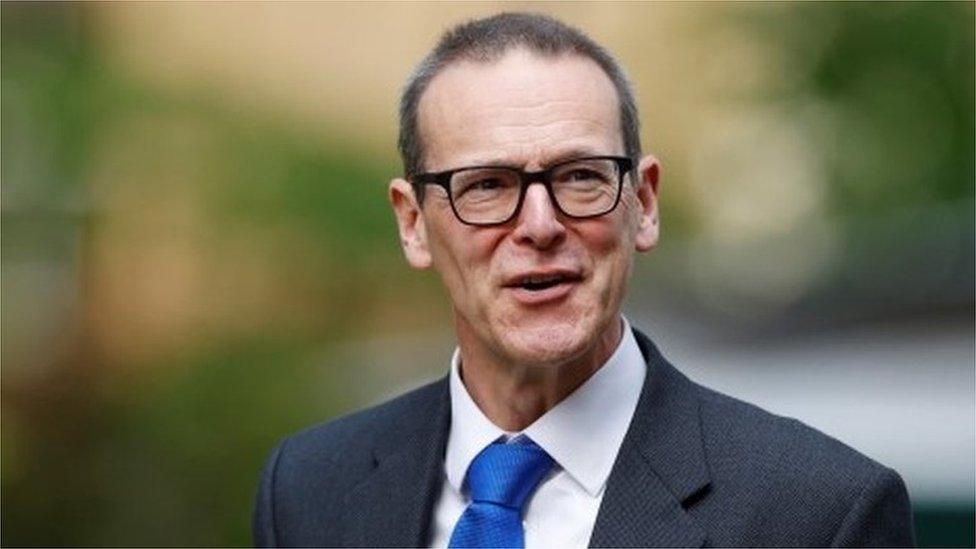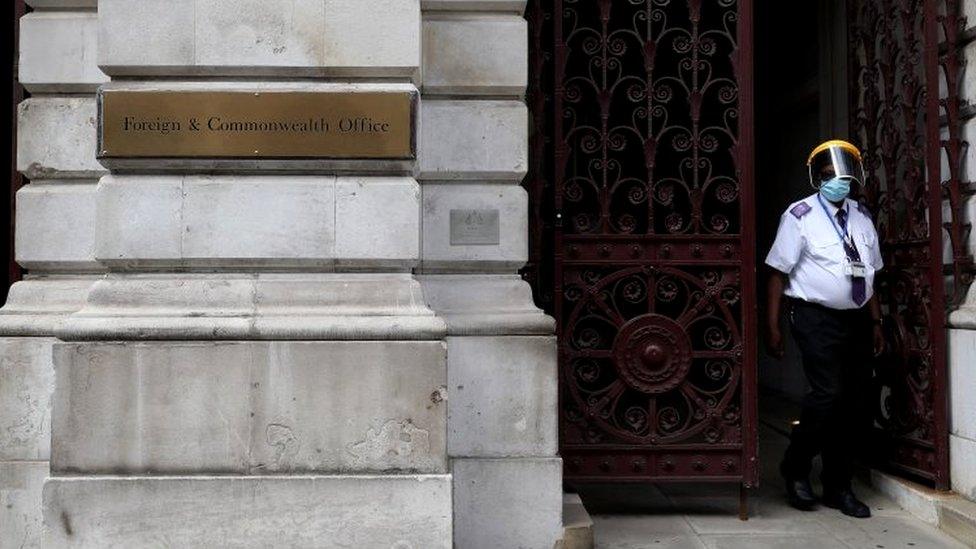Boris Johnson asks Foreign Office chief to stand down
- Published

The chief civil servant at the Foreign and Commonwealth Office is to step down from his role "at the request" of Prime Minister Boris Johnson.
Sir Simon McDonald - who has been permanent secretary for five years - will leave in September.
The PM is understood to want someone new in charge after the FCO and the Department for International Development merge later this year.
Sir Simon said he "fully" respected the decision.
In a message to staff, he said combining the FCO with the Department for International Development (DfID) was "the right move for our future overseas effort" and "the culmination of my time here".
"But a new effort needs new leadership," Sir Simon added. "Whoever [that is] will take on a simply wonderful job.”
Mr Johnson thanked the permanent secretary for his "strong leadership" and the "fantastic support" he had given him while he was foreign secretary between 2016 and 2018.

The Foreign Office is to be merged with the International Development department
Foreign Secretary Dominic Raab also paid tribute to Sir Simon, calling him "one of the finest diplomats of his generation".
Asked whether Mr Johnson wanted someone new to lead the merged departments, a spokesman for the PM said Sir Simon's five-year term was "the standard length of tour" for a civil service role at the FCO.
He added: "Simon has reached the end of his term and we want to make sure we have a new permanent secretary for the new Foreign, Commonwealth and Development Office and to have that person in place right from the start."


Sir Simon has been in post for almost five years, therefore it is a natural time for him to retire. But, of course, it is not as simple as that.
The permanent secretary turns 60 next March, and sources say he had been led to believe he would be allowed to stay on until then. But the PM apparently changed his mind.
Remember, Sir Simon was Mr Johnson's permanent secretary during his troubled time as foreign secretary, so there is historical baggage in the equation.
Sir Simon ruffled feathers in Downing Street recently too, when he told the Foreign Affairs Committee the government's decision to stay out of an EU medical kit procurement scheme was "political" - something he was forced to retract.
The senior civil servant is also old-school Foreign Office, seen as a traditionalist by some, at a time when No 10 is led by advisers with a revolutionary bent to reform Whitehall.
Sir Simon says in his statement that he respects the PM's decision and a new department needs new leadership.
But he now has the unenviable task of overseeing the merger of the two departments before handing over to his successor.

The prime minister announced the plan to bring DfID into the Foreign Office on Tuesday, saying it would lead to money being spent on aid that better reflected the UK's aims.
Mr Johnson said the "long overdue reform" would ensure "maximum value" for taxpayers, and the new Foreign, Commonwealth and Development Office would be up and running by September.
But the move - which has long been mooted in Conservative circles - was criticised by Labour leader Sir Keir Starmer, who said it would "diminish Britain's place in the world".
Three former prime ministers - Conservative David Cameron, and Labour's Gordon Brown and Tony Blair - also criticised the decision.
Mr Cameron said it would mean "less expertise, less voice for development at the top table and ultimately less respect for the UK overseas".
But fellow Tory and former Foreign Secretary, Jeremy Hunt, said after he had "wrestled with this issue", it was the "right thing to do".